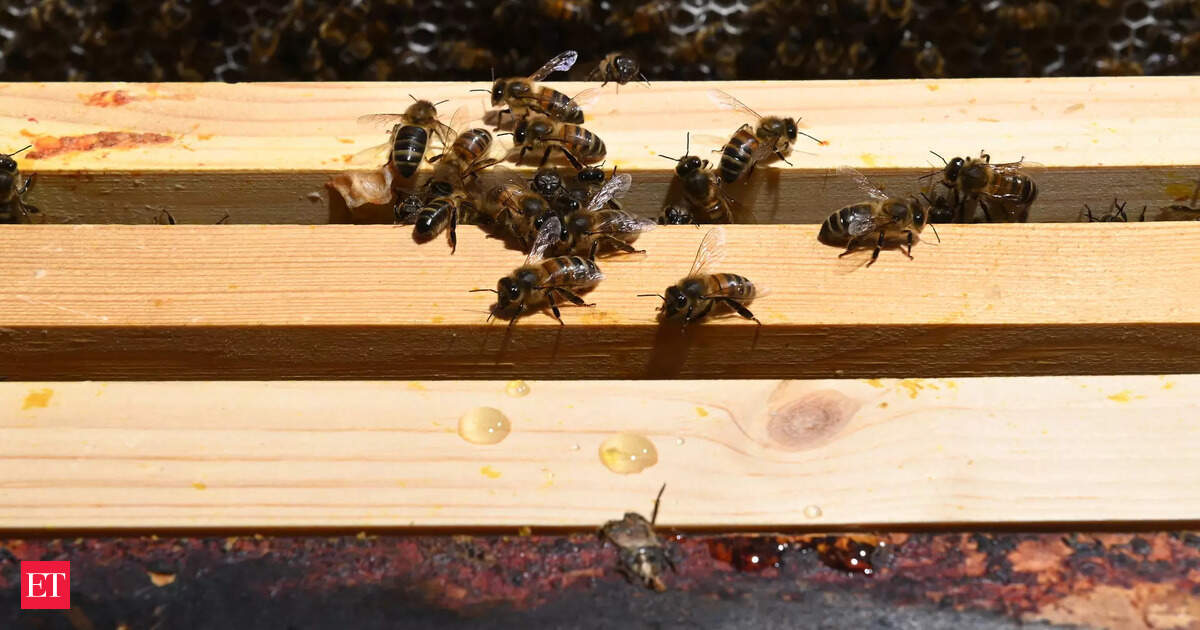Getty ImagesThe Africanized killer honey bee reached the United States after spreading up from Brazil
Africanized honey bees, also known by their menacing “killer bees” moniker, are spreading northward in the US, researchers fear. The “killer bee”, commonly found in South Africa, is far more aggressive than the European honey bee, the most common in the US, reports Daily Mail. Rather than isolated attacks, the killer bees swarm in vast numbers and can sting victims thousands of times in a short period. The insect species, which first arrived in America in 1990, has been found in 13 states in the South and Southwest, and are reportedly heading north as the weather warms up.ALSO READ: Thomas Fugate’s appointment amid Iran tensions triggers controversy: MSNBC’s Rachel Maddow brutally trolls Trump’s pickSwarms of killer bees spread in AmericaThe ‘killer bees’ attack when their hive is disturbed or in response to loud noises, such as a tree-trimmer or lawn-mower — even when it is a few blocks away. The bees can chase their target for up to a mile and experts say victims have little option other than to run, as per the Daily Mail report. Killer bee swarms have led to the death of a Texas man mowing his lawn and the hospitalization of three tree trimmers in the past three months. London’s Natural History Museum estimates that it would take approximately 1,000 stings to kill an adult human, but Africanized bees attack in swarms far greater. Some reports have counted as many as 300,000 to 800,000 bees in a single swarm.Live EventsBut experts now fear that warmer temperatures will allow the deadly insects to advance further north up the east and west coasts — putting tens of millions more Americans at risk. Dr Juliana Rangel, a bee expert in Texas who has been chased by the bees herself, warned: “By 2050 or so, with increasing temperatures, we’re going to see northward movement, mostly in the western half of the country.”ALSO READ: As World War III fears surge, Putin announces big move amid Israel-Iran conflict. Check detailsThe bee is visually similar to the European honey bee, a docile and familiar bee in the US, but is much more aggressive. Bee stings contain the toxin melittin, which can cause cells to burst and trigger massive inflammation in large quantities, potentially leading to organ failure and death. The Africanized killer honey bee reached the United States after spreading up from Brazil, where it was introduced in the 1950s in an attempt to boost honey production. At present, it is in 13 US states: California, Nevada, Utah, Arizona, New Mexico, Texas, Oklahoma, Arkansas, Mississippi, Louisiana, Alabama, Georgia and Florida.What separates them from other honey bees is their mode of attack. A colony of Africanized honey bees sends out far more bees in a defensive response, which leads to more stings on the victim. They are also more sensitive than standard honey bees to potential threats.An Ohio man was stung 20,000 times in 2022 while trimming tree branches. He survived only after being put into a medically-induced coma.ALSO READ: Jeff Bezos-Lauren Sanchez has an unusual request for the guests ahead of their high-profile weddingHow can you protect yourself?If someone is attacked by the bees, officials in most states advise people to ‘run away quickly’. While running, officials say people should pull their shirt up over their head to protect the face, but make sure this doesn’t slow their progress. Someone should only stop running when they reach closed shelter like a building or vehicle. It is likely that some bees will enter with them, experts say, but most will be locked outside. People are advised not to swat the bees or flail their arms, because this could antagonize them and lead to a worse attack.(You can now subscribe to our Economic Times WhatsApp channel)
Read More News onkiller bees spreading in USkiller beesAfricanized honey beesKiller bee attackshoney bee swarmsAfricanized honey bee risksUS states killer beesAfricanized killer bees in USkiller bees 13 US statesUS killer bees news
(Catch all the Business News, Breaking News, Budget 2025 Events and Latest News Updates on The Economic Times.) Subscribe to The Economic Times Prime and read the ET ePaper online….moreless
(You can now subscribe to our Economic Times WhatsApp channel)Read More News onkiller bees spreading in USkiller beesAfricanized honey beesKiller bee attackshoney bee swarmsAfricanized honey bee risksUS states killer beesAfricanized killer bees in USkiller bees 13 US statesUS killer bees news(Catch all the Business News, Breaking News, Budget 2025 Events and Latest News Updates on The Economic Times.) Subscribe to The Economic Times Prime and read the ET ePaper online….moreless
Explore More Stories123
